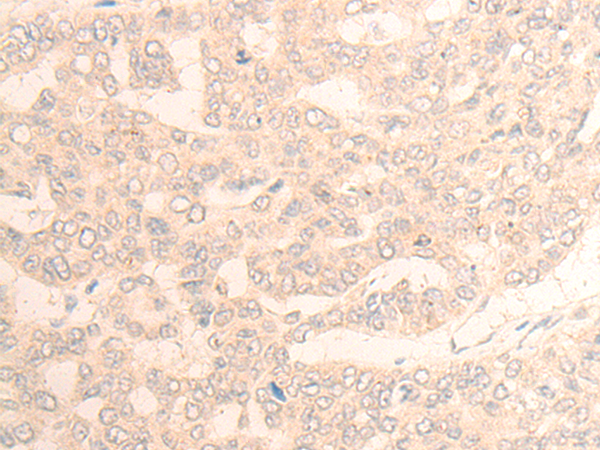
| WB | 咨询技术 | Human,Mouse,Rat |
| IF | 咨询技术 | Human,Mouse,Rat |
| IHC | 1/20-1/100 | Human,Mouse,Rat |
| ICC | 技术咨询 | Human,Mouse,Rat |
| FCM | 咨询技术 | Human,Mouse,Rat |
| Elisa | 1/5000-1/10000 | Human,Mouse,Rat |
| Aliases | KCCR13L; DAGLBETA |
| Host/Isotype | Rabbit IgG |
| Antibody Type | Primary antibody |
| Storage | Store at 4°C short term. Aliquot and store at -20°C long term. Avoid freeze/thaw cycles. |
| Species Reactivity | Human |
| Immunogen | Synthetic peptide of human DAGLB |
| Formulation | Purified antibody in PBS with 0.05% sodium azide and 50% glycerol. |
+ +
以下是关于DAGLB抗体的3篇参考文献及其摘要概括:
---
1. **文献名称**:*Diacylglycerol Lipase Beta Monoclonal Antibodies Reveal Expression in Central Nervous System Neurons*
**作者**:Tanimura A, et al.
**摘要**:本研究利用特异性单克隆抗体,首次证实DAGLB蛋白在小鼠中枢神经系统神经元中的表达,揭示其与内源性大麻素2-AG合成的关联,并探讨其在神经信号调控中的作用。
2. **文献名称**:*DAGLB-dependent lipid metabolism regulates macrophage polarization in tumor progression*
**作者**:Hsu KL, et al.
**摘要**:通过DAGLB抗体检测肿瘤微环境中巨噬细胞的蛋白表达,研究发现DAGLB通过调控脂质代谢影响巨噬细胞极化,从而促进肿瘤免疫抑制表型,为癌症治疗提供新靶点。
3. **文献名称**:*Genetic and Pharmacological Inhibition of DAGLB Suppresses Neuroinflammation*
**作者**:Jiang M, et al.
**摘要**:结合DAGLB抗体验证基因敲除模型,证明抑制DAGLB可减少神经炎症中2-AG的生成,缓解小胶质细胞过度激活,提示其在神经退行性疾病中的潜在治疗价值。
---
以上研究均利用DAGLB抗体进行蛋白表达定位或功能验证,涵盖神经科学、肿瘤免疫及代谢调控等领域。如需具体文献来源,建议通过PubMed或Sci-Hub输入标题进一步检索。
The DAGLB (diacylglycerol lipase beta) antibody is a research tool designed to study the enzyme diacylglycerol lipase-beta, a key player in the endocannabinoid system. DAGLB catalyzes the hydrolysis of diacylglycerol (DAG) to produce 2-arachidonoylglycerol (2-AG), one of the most abundant endogenous cannabinoids. 2-AG acts as a lipid signaling molecule, binding to cannabinoid receptors (CB1 and CB2) to regulate synaptic plasticity, inflammation, pain perception, and metabolic processes.
DAGLB is a membrane-associated enzyme predominantly expressed in the central nervous system, immune cells, and peripheral tissues. Its structure includes a transmembrane domain and a conserved serine hydrolase catalytic site, distinguishing it from its isoform DAGLA (alpha). Dysregulation of DAGLB activity or expression has been implicated in neurological disorders (e.g., epilepsy, neurodegeneration), metabolic syndromes, and cancer progression.
Antibodies targeting DAGLB are critical for detecting protein expression, localization, and quantification in experimental models (e.g., Western blot, immunohistochemistry). They help elucidate DAGLB's role in physiological and pathological contexts, particularly its interaction with lipid metabolism pathways and therapeutic potential in modulating endocannabinoid signaling. Validation of these antibodies often includes knockout controls to ensure specificity, given the structural similarities within the lipase family.
×